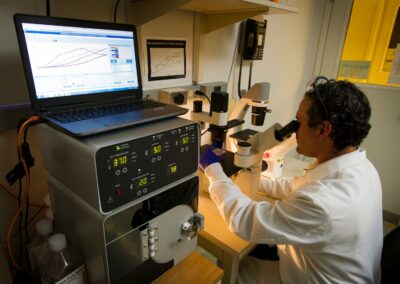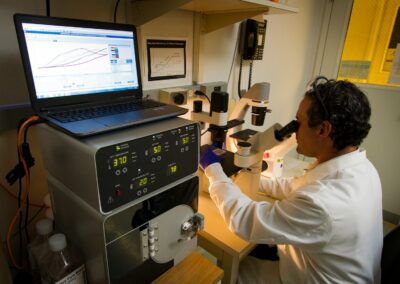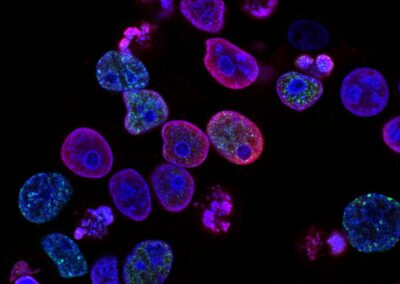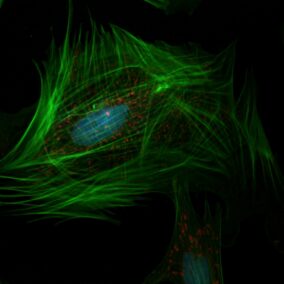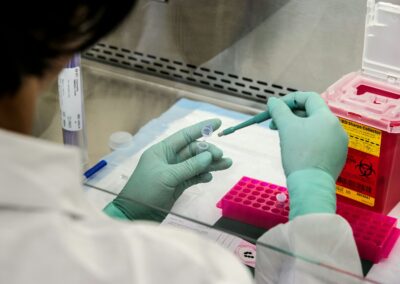Transforming Healthcare with Cutting-Edge Technology
Understanding CRISPR and Its Potential
The integration of CRISPR in gene therapy marks a revolutionary step in the field of genetic medicine, offering unprecedented potential for treating and possibly curing genetic disorders. CRISPR, which stands for Clustered Regularly Interspaced Short Palindromic Repeats, is a powerful tool for editing genes with high precision and efficiency. In regions like Saudi Arabia and the UAE, where technological advancement in healthcare is a priority, the adoption of CRISPR technology can lead to significant breakthroughs in medical treatment and patient care.
CRISPR technology works by using a specialized protein called Cas9 to make precise cuts in the DNA sequence at specific locations. This allows scientists to remove, add, or alter genetic material with remarkable accuracy. The ability to edit genes at such a detailed level opens up possibilities for correcting genetic mutations that cause diseases. For instance, CRISPR can be used to target and fix the defective gene responsible for cystic fibrosis, potentially providing a permanent cure for patients.
Moreover, CRISPR’s versatility extends beyond correcting single-gene disorders. It can be used to modify multiple genes simultaneously, which is particularly valuable for complex genetic conditions that involve several genetic factors. This multi-gene editing capability enhances the potential of CRISPR to treat a wide range of genetic disorders, including some that were previously considered untreatable. In innovative markets like Dubai, where cutting-edge medical treatments are in high demand, CRISPR technology can significantly advance the field of genetic medicine.
Applications and Advancements in Gene Therapy
The application of CRISPR in gene therapy has already shown promising results in both research and clinical settings. One of the most notable advancements is in the treatment of blood disorders such as sickle cell anemia and beta-thalassemia. Clinical trials using CRISPR to edit the genes in bone marrow cells have demonstrated the potential to alleviate symptoms and improve the quality of life for patients with these conditions. By correcting the genetic defects that cause these blood disorders, CRISPR offers a new lease on life for many patients.
Another significant application is in the field of oncology. CRISPR is being explored as a tool for enhancing cancer immunotherapy. By editing the genes of immune cells to better recognize and attack cancer cells, CRISPR can potentially improve the effectiveness of cancer treatments. This approach, known as CAR-T cell therapy, has shown encouraging results in treating certain types of leukemia and lymphoma. In healthcare hubs like Riyadh, where advanced cancer treatments are a priority, CRISPR-based therapies can provide new options for patients battling cancer.
Furthermore, CRISPR is being utilized in the development of treatments for rare genetic disorders. Conditions such as Huntington’s disease and muscular dystrophy, which currently have limited treatment options, are being targeted with CRISPR-based approaches. By precisely editing the faulty genes that cause these diseases, researchers aim to develop therapies that can halt or reverse disease progression. In regions like the UAE, where rare disease research is actively supported, CRISPR technology can drive significant advancements in developing effective treatments.
Challenges and Ethical Considerations in CRISPR Technology
Despite its tremendous potential, the use of CRISPR in gene therapy also presents several challenges and ethical considerations. One of the primary challenges is ensuring the accuracy and safety of the gene-editing process. Off-target effects, where unintended genetic changes occur, pose a significant risk and can lead to unforeseen consequences. Ensuring that CRISPR edits are precise and do not affect other parts of the genome is critical for the safety and efficacy of gene therapies.
Another challenge is the delivery of CRISPR components to target cells within the body. Effective delivery methods are essential for the success of CRISPR-based therapies. Researchers are exploring various delivery mechanisms, including viral vectors and nanoparticle systems, to ensure that CRISPR can reach and edit the intended cells without causing harm. In technologically advanced markets like Dubai, continued research and innovation in delivery methods are crucial for overcoming this challenge.
Ethical considerations also play a significant role in the development and application of CRISPR technology. The potential to edit human genes raises questions about the implications for future generations, particularly when it comes to germline editing, where changes can be passed on to offspring. Ensuring that the use of CRISPR is guided by ethical principles and regulatory frameworks is essential to prevent misuse and address societal concerns. In progressive regions like Saudi Arabia and the UAE, fostering ethical research practices and establishing robust regulations are vital for the responsible advancement of CRISPR technology.
Implementing CRISPR Technology in Healthcare Systems
Effective implementation of CRISPR technology in healthcare systems requires strategic planning, investment, and collaboration among stakeholders. Healthcare providers must invest in the necessary infrastructure and training to integrate CRISPR-based therapies into clinical practice. This includes educating healthcare professionals on the use of CRISPR technology, understanding its potential and limitations, and incorporating it into treatment protocols. In regions like Saudi Arabia and the UAE, where healthcare excellence is a strategic priority, investing in CRISPR technology can significantly enhance the quality of care.
Leadership and management play a critical role in driving the adoption of CRISPR technology in healthcare. Business executives and healthcare administrators must advocate for the benefits of CRISPR, highlighting its potential to revolutionize genetic medicine and improve patient outcomes. In forward-thinking markets like Dubai, strong leadership and vision are essential for fostering innovation and driving the successful implementation of CRISPR-based therapies.
Collaboration between healthcare providers, research institutions, and regulatory bodies is also crucial for advancing CRISPR technology. By working together, stakeholders can develop standards, best practices, and regulatory frameworks that ensure the effective and ethical use of CRISPR. In dynamic regions like Riyadh, fostering such collaboration can lead to significant advancements in genetic medicine and its applications.
Conclusion
In conclusion, CRISPR technology plays a crucial role in the development of gene therapies for treating genetic disorders, offering significant potential for improving patient outcomes and advancing healthcare. By providing precise and efficient gene editing capabilities, CRISPR can target and correct genetic mutations, offering new hope for patients with a wide range of genetic conditions. For regions like Saudi Arabia and the UAE, embracing CRISPR technology can drive innovation, improve patient care, and enhance the overall quality of healthcare. Through strategic investment, collaboration, and a focus on ethical considerations, the promise of CRISPR in gene therapy can be fully realized, paving the way for a new era in genetic medicine.
—
#CRISPR #GeneTherapy #GeneticDisorders #ModernTechnology #ArtificialIntelligence #BusinessSuccess #LeadershipSkills #ManagementSkills #ProjectManagement #SaudiArabia #UAE #Riyadh #Dubai



